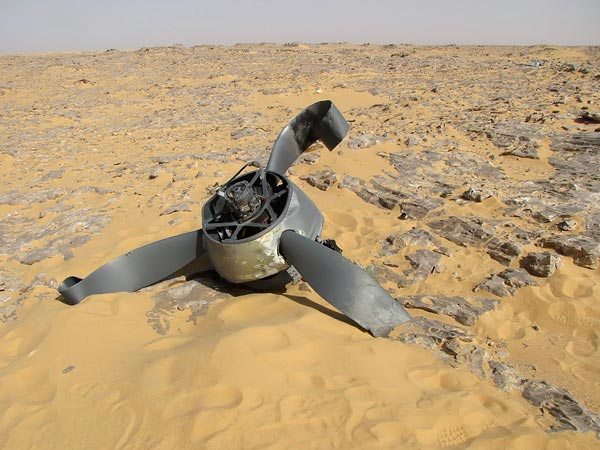"There are many dead in the brutish desert
who lie uneasy
among the scrub in this landscape of half-wit
stunted ill-will. For the dead land is insatiate
and necrophilious . The sand is blowing about still.
....
And sleep now. Sleep here the sleep of the dust."
From the First Elegy of 'Elegies for the Dead in Cyrenaica'
Hamish Henderson.
Thanks to Boing Boing net : Image of WW2 plane found in desert
The North African 'Desert War' involved a fair number of poets, many were Scottish, including ; Edwin Morgan, Sorley MacLean, Hamish Henderson, Malcolm MacCleod, G S Fraser, George Campbell Hay. Some of these poems were originally written in Gaelic or Doric. Vernon Scannell was from Buckinghamshire but served with the 51st Highland Division, as did fellow poet John Jarmain from Shrewsbury. Other poets who fought here included Spike Milligan and Keith Douglas.
In fact with was the North African campaign that gave rise to the most significant attempt to collect World War 2 poetry, the Cairo based 'Oasis Trust' that published its first anthology by service personnel in 1943 . This organisation was revived as the Oasis Salamander Trust which ran from 1976- 2012, and a whole series of anthologies resulted. Yet war memoir has not defined later views of the Desert War: Keith Douglas 'Alamein to Zazem' first appeared in 1946, two years after the poet's death in 1944. Vernon Scannell's 'Argument of Kings' ( 1987) and Spike Milligan's comic 'Rommel?'Gunner Who? A Confrontation in the Desert' (1976) also deservea mention. But no work steps up like 'The Cruel Sea ' does , a book that became a film, and contributed so much to how the Atlantic convoys are portrayed.
There was an understandable reluctance to glorify nature, reminding one of World War 2 Royal Navy serving writers such as Alan Ross and Nicholas Monsarrat admitting that they hated the sea. War was not shown as somehow fracturing an otherwise rural idyll. The desert climate saw extremes of heat during the day and cold during the night. Sandstorms were a hazard, flies a major plague.
There was a lack of triumphalism evident in the Desert poetry. Hamish Henderson recalled a captured German soldier saying to him "Africa changes everything :In reality we are allies, and the desert is our common enemy."
Sorley Maclean's 'Death Valley' , just as Keith Douglas in this poem 'Vergissmenicht' - was moved to write about a dead German soldier
Sitting dead in 'Death Valley'
below the Ruweisat Ridge,
a boy with his forelock down about his cheek
and his face slate-grey;
And in the last three verses stresses a shared affinity; the soldiers on both sides are sent to fight by those in power:
Was the boy of the band
who abused the Jews
and Communists, or of the greater
band of those
led, from the beginning of generations,
unwillingly to the trial
and made delirium of every war
for the sake of rulers?
Whatever his desire or mishap,
his innocence of malignity
he showed no pleasure in his death
below the Ruweisat Ridge.
Whilst John MacInes, writing about the Allied victory of El-Alamein in his poem of the same name,
That victory was not with price-
We paid for it with our hearts' blood;
We are leaving thousands prostrate
In graves in the dust of Alamein.
Of course the contrast of the desert and home memories were marked in poetry; To return to Hamish Henderson, from the 'Second Elegy of Elegies for the Dead in Cyrenaica', there's a great passage showing a soldier portraying the harshness of nature shrinking into a stage set, as a way of somehow managing the ferocity of desert warfare. But such a respite can only last for an instant.
The dreamers remember
a departure like a migration. They recall a landscape
associated with warmth and veils and a pantomime
but never focused exactly. The flopping curtain
reveals scene-shifters running with a freshly painted
incongruous sets. Here childhood's prairie garden
looms like a pampas, where grown-ups stalk (gross outlaws)
on legs of tree trunk; recedes; and the strepitant jungle
dwindles to scruff or shrubs on a docile common,
all but real for a moment, then gone.
Many Thanks for all their help
Richie McCaffrey
The Scottish Poetry Library
Further reading ' From the Line-Scottish War Poetry' edited David Goldie & Roderick Watson
(The Association for Scottish Literary Studies, 2014) ..Quotes from poems were taken from this work.
'Return to Oasis-War Poems &Recollections From the Middle East 1940-1946'
(The Salamander Oasis Trust, 1946)
'Scottish Poets in the Desert' Angus Calder, (article from 'Southfields 1999'
UPDATE New blog launched by Michael Bully in February 2023 Bleak Chesney Wold Charles Dickens/ 'dark' Victoriana
World War 2 Poetry blog supports the Second World War Experience Centre Please consider looking at their website and the SWWEC Youtube Channel

No comments:
Post a Comment